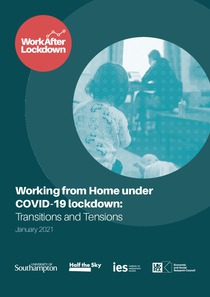Working from home under Covid-19 lockdown. Transitions and tensions. January 2021

Parry, Jane ; Young, Zoe ; Bevan, Stephen ; Veliziotis, Michail ; Baruch, Yehuda ; Beigi, Mina ; Bajorek, Zofia ; Salter, Emma ; Tochia, Chira
UK. Economic and Social Research Council
ESRC - Swindon
2021
26 p.
epidemic disease ; telework ; future of work ; survey
Work organization
https://www.employment-studies.co.uk/resource/working-home-under-covid-19-lockdown
English
"Work After Lockdown is a major research project funded by the Economic & Social Research Council (ESRC), as part of UK Research & Innovation's rapid response to Covid-19. The research examines how enforced working from home in the UK is changing how people want to work in the future and how organisations respond.
The project has completed the first wave of its research, relating to the period of rapid change during the lockdown of March-July 2020. This report presents insights from this first wave of data collection and summarises the learnings and implications for employers and policy-makers. The themes explored in the report relate to managing change; employee health, well-being, performance and productivity; working effectively from home; learning and development; and future demand for hybrid and flexible working.
The analysis draws upon three sources of data collected between July and December 2020:
Analysis of the national dataset Understanding Society COVID-19 Survey;
1,035 survey responses to our online worker well-being survey among employees working from home in jobs that were more office-based prior to the pandemic;
38 in-depth interviews with leaders, managers, and colleagues without management responsibilities in four case study organisations, selected to cover a range of geographical working experiences across the UK, as well as different organisational forms.
Verbatim quotes from interviews are used throughout the report."
Digital
The ETUI is co-funded by the European Union. Views and opinions expressed are however those of the author(s) only and do not necessarily reflect those of the European Union or the ETUI.